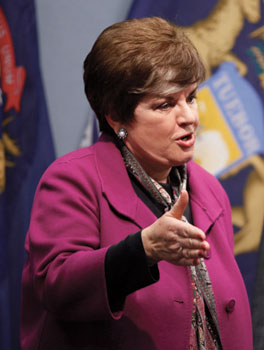Families That Won as Little as $1,000 in Mich. Lottery Cut Off From Food Assistance and Medicaid by DHS
MORE THAN 7,200 people who won at least $1,000 in the Michigan Lottery last year were living in households that received public assistance, according to a state report.
According to DHS director Maura Corrigan’s 3-page report, “In 2013, 18 lottery winners of jackpots valued at $100,000 or more were receiving public assistance benefits in Michigan at the time they won. Seven of those cases involved Food Assistance Program benefits, including one in which the lottery winnings were in the millions. Thanks to the Lottery Match law, DHS quickly closed that case.”
The Michigan Department of Human Services released the report on Oct. 23 that shows the state only closed about 11 percent of the total cases. The state’s “lottery match report” analyzes the impact of a 2012 law allowing the agency to cross-check lottery winnings with public assistance and end benefits in certain cases.
Residents in households receiving food stamps, Medicaid or some other form of assistance won nearly $44 million in 2013. That’s roughly $6,000 per case. Eighteen cases involved jackpots of $100,000 or more.
“These winnings add up,” said Maura Corrigan, director of DHS, who herself earns $140,000, while drawing a $52,370 pension as a retired Michigan Supreme Court justice. “While federal regulations prevent us from being able to discontinue certain types of benefits, we were able to close food assistance and Medicaid benefits for 810 recipients, saving taxpayers nearly $2 million.”
This means that families that won, on average, $2,500, or an additional $208 per month in income, saw their food assistance benefits cut off.
Corrigan’s report states, “Federal and/or state law still prohibits closure of many assistance benefits to the majority of Michigan lottery winners who are matched. This means a multi-million dollar lottery winner can still qualify for certain assistance and benefits.
“Clearly, there is potential for big savings should regu tions be changed to allow for lottery winnings to be considered assets when determining eligibility for certain federal assistance programs.
“Of these total cases, DHS closed 810 cases receiving 977 benefits among recipients who had lottery winnings of more than $1,000. Most of these benefits closures involved food assistance, followed by Medicaid.”
There are at least four bills waiting to pass through the Legislature that would stop lotto winners from being able to continue collecting public assistance, according to the report. Federal policy changes would also make it easier for the state to close those types of cases, Corrigan said.
“It does not sit well with taxpayers when someone who has won millions of dollars continues to collect assistance because of federal loopholes that do not count these winnings as assets,” she said.
A series of similar cases, including a Bay City man who won $2 million in a lotto game and continued to receive food assistance, inspired the state to pass the law that restricts benefits for lottery winners.

